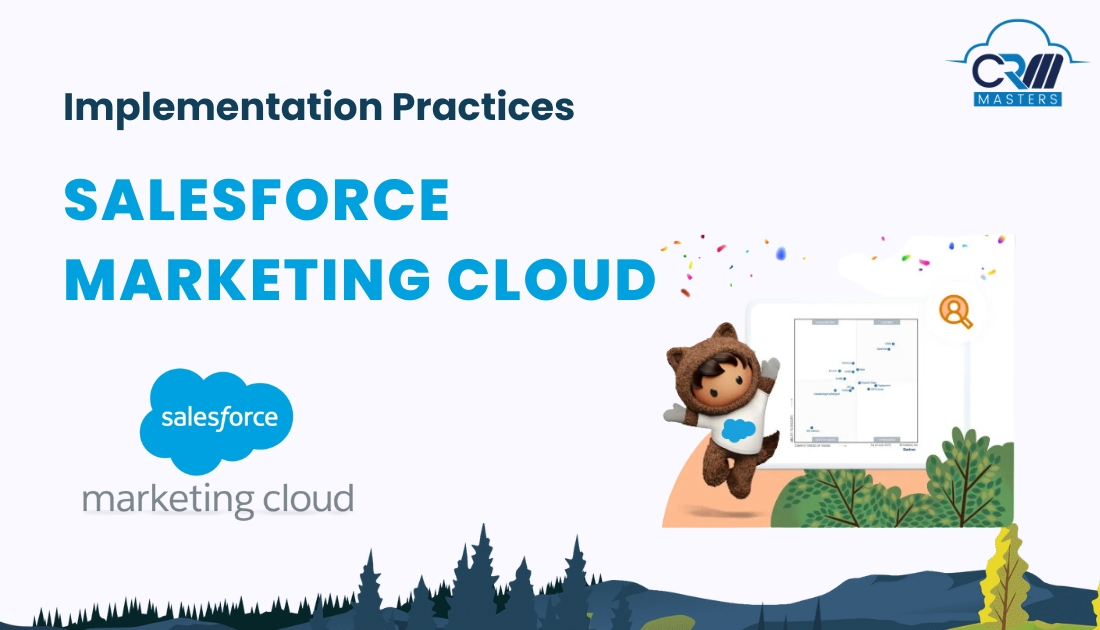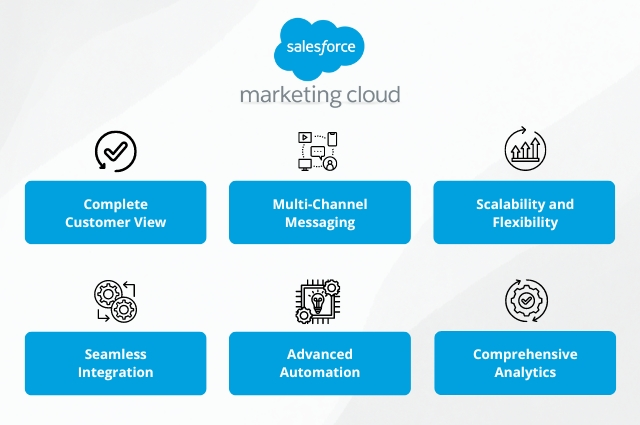
Best Practices for Implementing Salesforce Marketing Cloud
Nowadays customers are being flooded with countless marketing messages daily, businesses are constantly looking for innovative ways to cut through the noise and engage their audience effectively. Salesforce Marketing Cloud emerges as a powerful solution, offering a comprehensive suite of tools to streamline marketing efforts and drive meaningful customer interactions.
However, implementing Salesforce Marketing Cloud requires careful planning and execution to unleash its full potential. Let’s find out what Salesforce Marketing Cloud is, why businesses should choose it, and the best practices for its successful implementation.
What is Salesforce Marketing Cloud?
Salesforce Marketing Cloud is a powerful platform designed to empower businesses with tools for personalized, data-driven marketing across multiple channels. It enables marketers to create customized customer journeys, deliver relevant content, and analyze campaign performance, all within a single integrated platform.
With various features like email marketing, social media management, advertising, automation, and analytics, Salesforce Marketing Cloud serves as a one-stop solution for businesses.
Salesforce Marketing Cloud Effective Solution
Email Marketing
- Businesses can segment email lists based on demographics, behavior, and purchase history.
- Highly targeted email content increases recipient engagement and conversion rates.
- Personalization features dynamically insert customer-specific information into email campaigns.
- Automation streamlines email marketing processes.
- Timely and triggered email sends ensure messages reach recipients at the right moment.
- Automation drives higher levels of engagement and enhances campaign effectiveness.
Mobile Marketing
- Salesforce Marketing Cloud offers mobile marketing solutions utilizing SMS, push notifications, and in-app messaging.
- Mobile-focused approach allows for personalized and timely interactions.
- Enhanced customer experiences result from reaching customers on their mobile devices.
- Adopting a mobile-first mindset optimizes campaigns for mobile devices.
- Content and experiences are specifically tailored for seamless and engaging mobile interactions.
- Maximizing impact by tapping into the ever-growing mobile user base.
Advertising and Journey Optimization
- Powerful advertising functionalities enable precise ad targeting.
- Leveraging customer data and segmentation delivers relevant and personalized ads.
- Maximizes ad spend efficiency and increases conversion chances.
- Empower businesses to deliver the right message at the right time.
- Data-driven insights and advanced analytics identify effective touchpoints.
- Tailored messaging enhances overall marketing impact along the customer journey.
Why Should Businesses Choose Salesforce Marketing Cloud?

Complete Customer View:
Salesforce Marketing Cloud provides a complete view of customer data, allowing businesses to get:
Provides valuable insights into customer preferences.
Prepare personalized campaigns for their audience.
Drive higher conversion rates and engagement.
Multi-Channel Messaging
Salesforce Marketing Cloud helps businesses craft personalized SMS and Emails according to the customer. It can empower businesses with multichannel messaging in the following ways:
- Streamline and strengthen service
- Support case communication purchase-related communications
- Make Financial Communications Simpler
Scalability and Flexibility:
Whether you’re a small startup or an established business, Salesforce Marketing Cloud offers scalability to grow alongside your business. Flexibility in this tool allows businesses to adapt to changing needs.
- Allows businesses to grow alongside their expanding needs.
- Adapt to changing market conditions.
- Modify strategies to meet evolving customer demands.
Seamless Integration:
Salesforce Marketing Cloud integration with other Salesforce products such as Sales Cloud and Service Cloud enables a better customer experience.
- Synchronizes data and processes across sales, marketing, and customer service departments.
- Streamlines workflows.
- Ensures consistency in customer interactions across various touchpoints.
Advanced Automation:
It enables businesses to automate tasks that are repetitive and do not require as much focus, classify audiences, and deliver personalized content. By utilizing AI-driven insights, businesses can optimize campaign performance and drive efficiency.
- Tasks such as audience classification and content personalization can be automated.
- Optimize campaign performance.
- Increase operational efficiency.
Comprehensive Analytics:
Data-driven decision-making lies at the heart of successful marketing strategies.
Marketing Cloud offers strong analytics tools to measure:
- Allows businesses to measure campaign effectiveness.
- Tracks key performance indicators (KPIs) to gauge success.
- Refine marketing strategies.
- Improve overall performance and ROI.
How to Implement Salesforce Marketing Cloud in Your Business?
Here are some best practices to ensure a smooth and successful implementation:
-
Define Clear Objectives
Set measurable objectives for implementing Salesforce Marketing Cloud. Whether your goal is to increase lead generation, improve customer engagement, or drive sales conversion, having a clear roadmap will guide the implementation process and measure its success.
-
Seek Expert Guidance
Work with certified Salesforce Implementation Partners, to guide you through the implementation process. Their expertise and experience can help accelerate deployment, reduce risks, and optimize the value derived from Salesforce Marketing Cloud.
-
Conduct a Comprehensive Assessment
Before diving into implementation, conduct a thorough assessment of your current marketing processes, data infrastructure, and technology stack. Identify existing pain points, data quality issues, and areas for improvement to inform your implementation strategy effectively.
-
Data Quality and Integration
For an effective marketing strategy, data is one of the main components. Ensure data quality by cleansing, standardizing, and deduplicating your customer data before migration to Salesforce Marketing Cloud. Establish seamless integration with existing systems to ensure data flows smoothly across platforms.
-
Customization and Personalization
Leverage the customization capabilities of Salesforce Marketing Cloud to tailor the platform to your specific business needs. Design personalized customer journeys based on demographic, behavioral, and contextual data to deliver relevant content at every stage of the customer lifecycle. Experiment with dynamic content, personalized recommendations, and A/B testing to optimize engagement and conversion rates.
-
Monitor the Performance
Implementation is just the beginning of your journey with Salesforce Marketing Cloud. Continuously monitor campaign performance, analyze key metrics, and request feedback from users to identify areas for improvement. Repeat your strategies, experiment with new features, and stay up-to-date on industry trends to stay ahead of the curve.
Ready to Leverage Salesforce Marketing Cloud?
Salesforce Marketing Cloud offers a powerful suite of tools to transform marketing strategies and drive business growth. By following best practices for implementation, businesses can unlock the full potential of Salesforce Marketing Cloud, delivering personalized experiences that resonate with their audience and driving tangible results.
CRM Masters is a Salesforce Certified Consultant that helps businesses stay ahead of the competition with careful planning, strategic alignment, and ongoing optimization.












